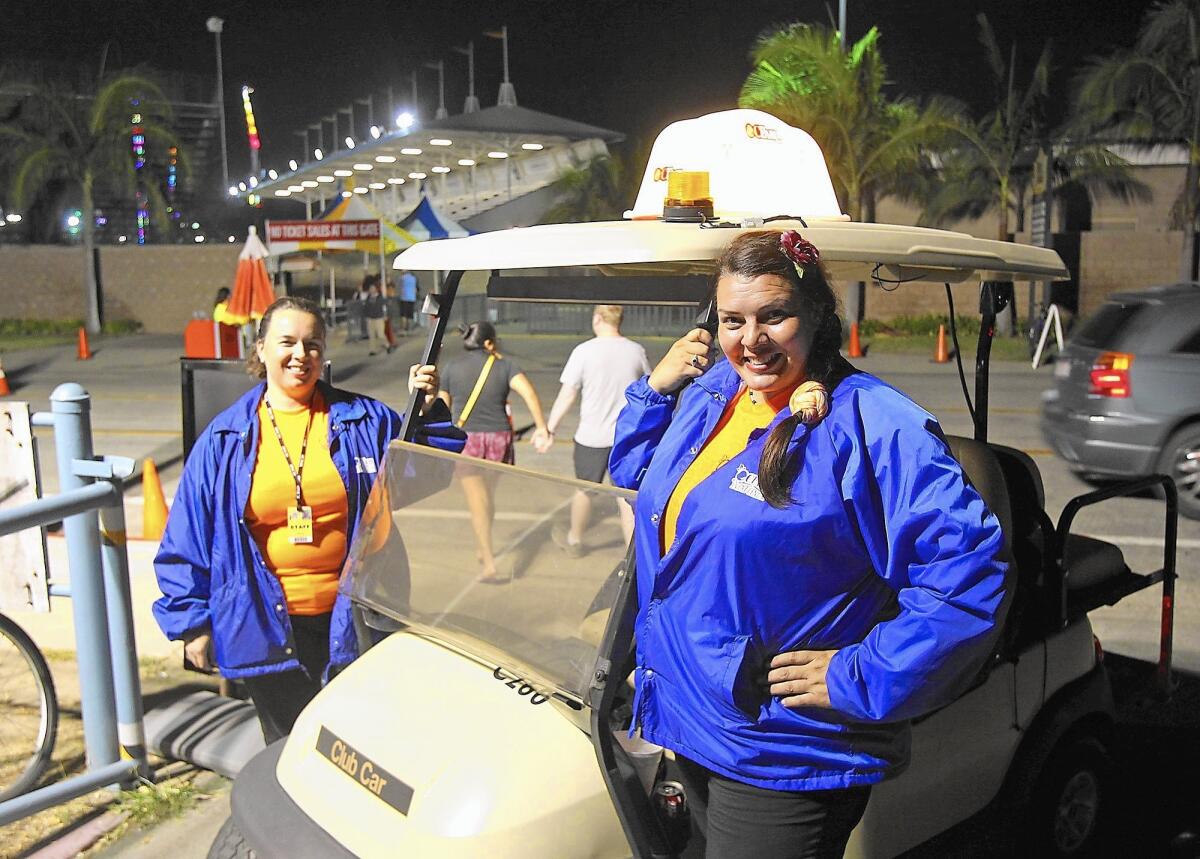OC Fair ‘ambassadors’ do dirty work, spread goodwill

Armed with a litter picker and resilience, Janet Chompff hopped off her golf cart feeling curious.
Was that thing she spied on the ground another dirty diaper?
It was.
Picker in hand, Chompff snagged and stashed it in a bag tied to her cart. Her companion, Jenny Jones, wondered aloud why anyone would leave a diaper on the street.
The duo are among the newly hired OC Fair “ambassadors” working to strengthen community relations between the fairgrounds and adjacent Costa Mesa neighborhoods.
The job involves traveling in pairs around College Park and Mesa del Mar in specially marked golf carts, from an hour before the fair opens to about an hour after it closes.
Ambassadors provide goodwill, answer questions and remain vigilant for trouble, trash and illegal parking. They are not law enforcement and do not issue parking tickets or fines.
But, with their radios and cell phones, they can call in police or other proper help to deal with whatever situations they uncover.
In one of her first acts as the new fairgrounds CEO earlier this year, Kathy Kramer announced the ambassador program, which is tailored it to address decades-old community concerns, including excess trash, illegal parking, noise and rowdy groups.
Fair officials say neighbors like having contact points in case of problems and someone who can discover and fix problems on the spot.
“I’m telling you, everybody loves it,” said Nick Buffa, safety and security supervisor for the fairgrounds.
Standing in front of the security station, tucked behind the Action Sports Arena, Buffa pointed to a parked ambassador cart nearby. Each has a custom-made OC Fair sign on top. The signs glow yellow and have the ambassador hotline printed on them.
People can see the carts coming “from a mile away,” Buffa said.
But the signs have also created a bit of an identity crisis.
They make the carts look an awful lot like pizza delivery vehicles.
“Maybe we should bring Little Caesars,” Jones joked.
The ambassadors log nearly every little thing they do, as well as where and when they did it. All that data will be compiled.
On a recent evening, Jones and Chompff made their rounds through College Park and along Vanguard Way, their bag loading up with what they deemed “fair” and “not fair” trash.
Throughout the night, they picked up broken beer bottles, still-cold beer cans, baby wipes, a banana peel, a soiled T-shirt, a bag of sunflower seeds and a wrapper for Nutrisystem chocolate-flavored pretzels.
“That’s the last thing you should be eating at the fair,” Chompff quipped.
Along Fair Drive, just up the way from Fairview Road, they rolled up to some concert-goers leaving a show they found unimpressive because the band didn’t play enough hits.
Jones logged their complaint and encouraged them to bring their concerns to fair management.
About an hour later, ambassadors Leif Alejandrino and Todd Kaiser begin their patrol through Mesa del Mar.
The pair joked that they’re often asked for rides, but noted that they’re not a taxi service. They will, however, give certain pedestrians — pregnant women, for instance — a lift.
Kaiser pointed to the new trash cans placed around Mesa del Mar. The simple act of putting them there, he said, has significantly reduced litter.
“People are actually doing the right thing,” Kaiser said.
Alejandrino and Kaiser didn’t find as much trash in Mesa del Mar as their colleagues in College Park, but they soon spotted suspicious activity on Presidio Square, a small street north of the TeWinkle Park Athletic Complex.
“Those people are seriously drinking,” Kaiser said. “That’s actually pretty rare. It looks like they’re gonna get in a car.”
Alejandrino called police, who told the group to disperse.
They did — after exchanging parting hugs.
Sometimes drunks wander into the neighborhoods from the fair.
“We’re usually pretty lucky that they have at least one sober friend [helping] them,” Alejandrino said.
About 15 minutes after the police responded to the call, Alejandrino and Kaiser rolled back to the see the aftermath: bottles and cans littering the bushes.
Kaiser figured they were trying to stash the booze from sight.
But, he added, “at least it’s not a diaper.”
